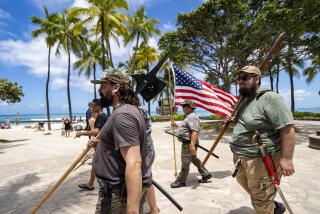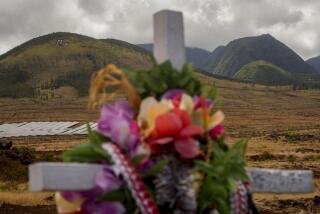In Paradise, Gambling Issues Persist
- Share via
HONOLULU — Bob, a former airport screener, stole money from tourists’ luggage to support his gambling problem. Sam lost $75,000 in a month betting on sports. Al hasn’t gambled for 13 years, but every day he itches to roll dice.
People in Hawaii are about as far from legal gambling as they can get. No lotteries. No scratch tickets. No Indian casinos. No bingo parlors or horse tracks.
But despite Hawaii’s isolation, gambling has torn apart families here, caused financial ruin and spawned violent crime. Online gambling only makes it worse.
The state spends millions annually on drug and alcohol prevention and treatment, but nothing to help problem gamblers.
“In Hawaii, it’s sort of like: see no evil, hear no evil, speak no evil,” said Keith Whyte, executive director of the National Council on Problem Gambling. “They’re ignoring a substantial problem in their midst, apparently because they want to pretend that since it is illegal, no one does it and no one gets in trouble.”
That’s like saying there’s no drug problem because drugs are illegal, Whyte said.
Though the Washington-based group doesn’t advertise in Hawaii, its 24-hour hot line received 763 calls last year -- more than two a day -- from gamblers in the state seeking help.
“These are disorders that are deeply rooted in the human condition. They are not dependent on legality of the activity,” Whyte said.
State Health Director Chiyome Fukino, whose agency oversees treatment programs for mental health and drug abuse, said the number of calls was not significant in comparison with the state’s population.
“I think the lines of personal responsibility and government control, although not always clear, in this instance are more heavily weighted toward personal responsibility,” she said when asked about the lack of state programs to deal with gambling addiction.
With the state offering no help, the last resource for many pathological gamblers is a weekly Gamblers Anonymous meeting -- the only one in the islands -- held Tuesday nights in a church in downtown Honolulu. Hundreds have attended through the years. About a dozen attend regularly.
Some come by choice. Others are under a judge’s order.
They sit around a table on folding metal chairs in a stuffy room with cinderblock walls, cooled only by the trade winds coming through the jalousie windows and three fans.
At a recent meeting, members agreed to share some of their stories with the Associated Press if their identities remained protected. Some have known one another for years only by first names.
“Hi. My name is Al. I am a compulsive gambler,” said the group’s leader, a businessman in his mid-50s who has been attending the meetings since 1982.
Al’s downfall is dice. He says he hasn’t rolled any since Oct. 13, 1993, but quickly points out that a gambler can never be cured.
“I’ve been here for 20 years-plus, but I haven’t been clean for 20 years-plus,” he said. “We recognize it’s a lifelong process.”
Al’s addiction began decades ago when he ran a casino in his dormitory at the University of Hawaii. He later gambled away his life savings, custom house and almost his future, racking up nearly $400,000 in gambling debts at one point.
Dina, the only female in the group, is a hairdresser who got addicted to slot machines while living in Nevada. What started with $60 losses turned into thousands, as she maxed out credit cards, took out loans and lied to her husband.
“It was just a major nightmare to keep it all secret,” said Dina, who adds that her life is much better now that she’s away from gambling.
While cockfights and card rooms are popular in Hawaii, sports betting is king. It can get gambling addicts deep in the financial hole, taking them years to climb out.
City efforts to stem the gambling are ineffectual. Police usually target the operators instead of the gamblers themselves, and investigations can take months or years. But as soon as one operation is dismantled, another springs up. Gambling is a misdemeanor offense in Hawaii.
Bookies here operate “6-5” games, police and gamblers say, meaning a losing bettor would have to pay $6 on every $5 wagered, which equals a 20% commission. So a losing $100 wager would cost $120.
Sports betting is popular because bets can be made by phone, without having cash upfront. The Internet has only made it easier.
“Online gambling is big now,” said Rick, a sports gambling addict at the Gambler Anonymous meeting. “You can go on there at any time and bet on anything from soccer in Great Britain to any horse race in the world.
“I even bet on WNBA games. I know nothing about the WNBA.”
The dozen addicts at the meeting had combined losses of more than $1 million. Many are still paying off their debts.
A common theme was how they couldn’t stop -- no matter how much they were up, or down.
“It’s not about money because no matter how much money we make, it’s never enough,” Al said. “The way we gamble is so obsessive.”
When the money runs out, gambling addicts often fall into desperation and sometimes crime. In recent years, there has been a series of crimes linked to gambling in Hawaii. Notable cases include:
* Three Honolulu police officers were indicted in April for allegedly conspiring with a card and cockfighting operation located across from an elementary school.
* Three men were shot, two fatally, on a municipal golf course in 2004. Police said the shootings were part of a dispute between factions competing to provide security at gambling houses.
* Banker Sukamto Sia was sentenced in 2002 for bankruptcy and wire fraud. His bankruptcy filing included $13.5 million owed to two Las Vegas casinos.
Hawaii’s love of gambling can be witnessed in Las Vegas, which is the top destination for islanders and sometimes referred to as the “ninth Hawaiian island.”
The hub for isle residents is the California Hotel and Casino, owned by Boyd Gaming, which charters 10,000 Hawaii travelers a month to Las Vegas.
Despite being named after the Golden State, “The Cal” specifically caters to patrons from the Aloha State, with 80% of their guests from Hawaii.
Lottery and casino companies occasionally lobby the Legislature and business leaders to open the state, but no serious effort has been made in at least five years.
“I think those guys are hopping over us now and going to Macau,” said Judy Rantala, president of Hawaii Coalition Against Legalized Gambling. “I think they’ve given up on us -- I hope they’ve given up on us.”
Rantala says she likes Hawaii the way it is.
“I don’t think it would do a bit of good to have a big flourishing casino in Waikiki or in Ko Olina,” she said. “We can get tourists here without gambling.”
More to Read
Sign up for Essential California
The most important California stories and recommendations in your inbox every morning.
You may occasionally receive promotional content from the Los Angeles Times.










